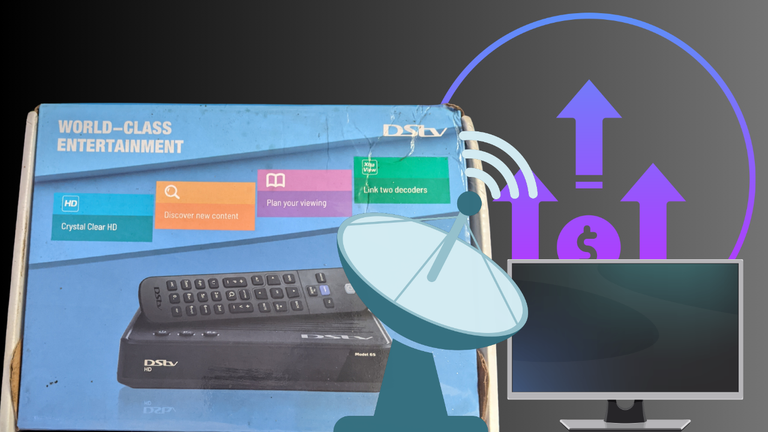Is The Era Of Subscription Ingeniously Diabolical?

A subscription is when you pay for a service on a regular basis and in advance for a set period of time that must be renewed or you risk being disconnected. The subscription model is widely used in almost every aspect of commerce, including the internet, technology, television, and many others. However, I would like to focus on TV subscription models.
In Africa, Multichoice's DSTV is one of the most popular TV subscription services. The reason for this is that they are a South African-based company that is well-known for being one of the first in the industry, and as a result, they have a large user base that spans most African countries. As a result, they have essentially established a monopoly in many African countries, particularly in Nigeria, where they have arguably the best patronage.
One aspect of the subscription model, similar to Multichoice's, is that they wait for the company to grow in user base, establish a customer base that is blindly loyal to them, and then begin to reduce the quality of the product and increase the price of that previous poor service while blaming it on parameters such as government policies and inflation, followed by a drop in the value of the native currency against the US dollar.
Meanwhile, the main reason they can do this is that they have no competition, the monopoly of service allows them to raise prices with no consequences, and they also have secret government support. The majority of African governments that deal with foreign businesses always collaborate with these companies. They take a small percentage from the companies and give them a monopoly on providing that service, making it difficult for potential competitors to emerge.
So these companies are happy to pay the government a small percentage of that money in exchange for the right to manipulate prices and raise them whenever they want without fear of losing customers or being sanctioned by the government. If I recall correctly, Multichoice has raised the price of their TV subscriptions three times in the last two years. The most recent one occurred yesterday, when they raised prices by 25% for the same services they had previously provided.
Many people have been clamouring for pay as you watch, which means your subscriptions only read when you are watching, or the ability to choose which stations or services you want and pay for them all at once. This would be especially beneficial for people who are frequently away from home due to their jobs; imagine having a subscription running while you are at work and only getting about 2 hours per day on a 24-hour subscription. Another factor is electricity. Nigeria may have Africa's poorest electricity infrastructure.
This means that almost every DStv subscriber in Nigeria is receiving less than what they pay for. However, Multichoice has declined all offers to improve their services. Instead, they give you about 5% of what you want to watch and 95% of what you will not watch during your subscription, and they do not let you pause your viewing time when their service goes down due to bad weather.
They consider this circumstance to be beyond their control and therefore do not need to compensate you in any way. Even when you consider the quality of their services, it has steadily declined. They repeat broadcasts even when it is unnecessary, and they do so to conceal the fact that they are unwilling to invest in higher-quality programming. When Multichoice first arrived in Nigeria, their service was excellent; they were the only company with the patent and rights to broadcast European football; however, they have since segmented these services and only provide them to those who pay the highest levels of subscription.
The Government Are In On It
I own a DSTV, and most of their seemingly cheap packages are not on the lower end of expenses, and they have even removed some of the programs that force me to subscribe to specific packages. Unfortunately, they will continue with this model. The reasons are twofold: first, they have a monopoly granted by the Nigerian government, and second, they have a large customer base and patronage that has no choice but to use their services. Netflix and other internet-based services have their own, but Multichoice is the worst and most diabolical.
Interested in some more of my works
Is it Easy To Make Money?
Nigeria: A Unique Business Market & Industry
Virtual Bank Apps In Nigeria: An Experience Of Gamification
How To Find The Next "BIG" Meme Coin
Personal Finance: Achieving Intentional "Saving" Goals
Playing The Survival Game: Human Nature In Introspection
"Un-PAYING" The Debt You Owe

Posted Using InLeo Alpha
If fact, this is a serious issue in our economic system: companies reducing the quality of their products overtime but then increasing the price.
It's basically what I talked about the subscription model of multichoice; appalling.
A person should take the subscription only if he wants to use this thing daily, otherwise he has to pay for free.
All my subscription in a month is almost 70k naira, is high time I cut those unnecessary spending and divert those funds into something better.
That is a lot of money man. I mean I do about 8k internet per month and that's probably because it's w priority. As for DStv, sometimes I just do the smallest amount possible.
Cutting down might be essential
That really sucks! It's always about how much these companies can bribe the government officials. Here many satellite and cable services tend to do the same and charge higher prices on packages for something you want to watch. It's the reason I mainly watch streaming programs now, not more ripoff TV service!
The government over here are in on it and support all the price hike, provided they can get their share of the money from these TV companies. Sadly they give them the monopoly and people don't really have the choice but to pay.
That's just wrong! We have several monopolies here as well that the government should break up but they don't because the politicians are getting "contributions" from these companies. Just legalized bribes...
The level of corruption definitely differs. I tell people that there's no place as corrupt as Nigeria. It's appalling, funny thing is, people keep voting their slave masters.
On that I agree with you and it's truly sad to see it. They should be trying to protect their people, not let the company rob them blind!
DSTV is really enjoying because they don’t have any competitor but I’m sure that will change someday whether we like it or not. I also support the motion “pay as you watch”. I spend little time in the house and I only watch some channels ay night. There are times when I don’t even watch at all so it won’t make sense to keep paying for what I’m not watching
I’ve stopped subscribing for like two months now😅
I don't like the subscription model and it sucks to hear that they aren't changing. It just feels like people forget it and they are definitely not getting what they pay for. With the internet, I just don't think those services are worth it.
Their services will only keep on getting worse, as they've cornered the market with the government's support. Truly, they're ripping people off paying way more for way less. Many subscription models tend to follow that part once they've garnered a large enough customer base.
Corruption is their ally. But aren't TV subscription service days numbered anyway, regardless of how powerful they seem now?
I think in some places like Africa, they'll thrive ages to come no matter how thieving they become, the government will ensure it's remains that way.
I wouldn't be so sure. Once enough people have affordable and stable internet, nothing is stopping them from ditching TV service companies for online content growing in production quality.